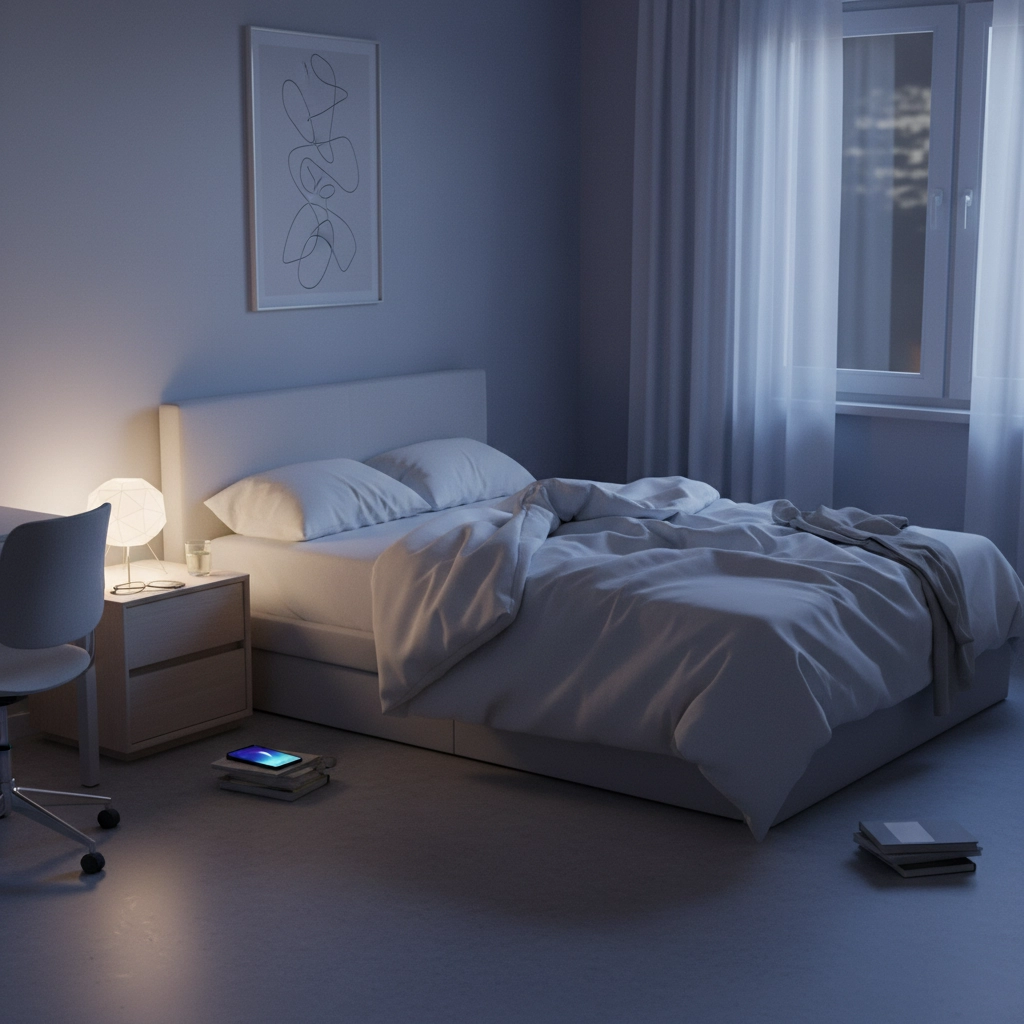Why Sleep Problems Are Destroying Your Teen's Mental Health (And 5 Family Strategies That Actually Work)
- clairestew
- Sep 30, 2025
- 5 min read
If you're a parent watching your teenager struggle with mood swings, anxiety, or depression, you might be surprised to learn that the root cause could be hiding in plain sight: their sleep. What many Chicagoland families don't realize is that sleep problems aren't just making teens tired, they're fundamentally rewiring their developing brains in ways that can trigger serious mental health crises.
The statistics are sobering. Research shows that teens experiencing long sleep onset times and frequent night awakenings face significantly higher risks of emotional and behavioral difficulties. Even more concerning, sleep deprivation can actually trigger clinical depression and anxiety in teens who are already vulnerable. But here's the hopeful news: families have more power than they think to break this destructive cycle.
The Hidden Mental Health Crisis Happening in Your Teen's Bedroom
Your teen's brain is still under construction, and sleep is the primary time when this critical development work happens. During deep sleep, the adolescent brain processes emotions, consolidates memories, and literally cleans itself of toxins that build up during waking hours. When this process gets disrupted night after night, the consequences ripple through every aspect of your teen's mental health.

Sleep deprivation creates a perfect storm of psychological vulnerability. Teens who can't fall asleep easily or who wake up frequently during the night lose their ability to regulate emotions effectively. What might seem like typical teenage moodiness could actually be the result of a brain that's running on empty, unable to process the normal stresses of adolescent life.
The connection between sleep and suicidal thoughts is particularly alarming. Sleep problems among teens represent a major risk factor for suicidal ideation, independent of other mental health conditions. As one Stanford psychiatrist explains, "Sleep, especially deep sleep, is like a balm for the brain." Without it, teens lose their capacity to think clearly, problem-solve, and reach out for help when they need it most.
Perhaps most frustrating for families is the vicious cycle that develops between anxiety and sleep. An anxious mind races with worries about school, friendships, and family stress, making it nearly impossible to relax at bedtime. This broken sleep leaves teens exhausted the next day, which actually amplifies anxiety symptoms and creates an endless loop of sleeplessness and mental health deterioration.
Strategy #1: Establish Loving but Firm Sleep Boundaries
The first strategy might surprise you: research consistently shows that teens whose parents set firm bedtimes get more sleep and experience less daytime fatigue. This doesn't mean becoming the "sleep police," but rather creating a family culture where healthy sleep is a non-negotiable priority.
Work with your teen to establish a consistent bedtime that allows for a full eight hours of sleep, even on weekends. Yes, this might mean saying no to late-night social events or pushing back on homework that consistently keeps them up past bedtime. Frame this boundary as an act of love and protection for their developing brain, not as punishment or control.

Remember, you're not just setting rules, you're teaching your teen that their mental health matters enough to protect. Many teens actually feel relieved when parents take an active role in prioritizing sleep, as it removes the pressure to choose between social expectations and their body's needs.
Strategy #2: Create a Tech-Free Wind-Down Sanctuary
The blue light from phones, tablets, and computers doesn't just keep teens awake, it actively suppresses melatonin production and keeps their brains in a state of hyperalertness. Implementing a family rule that requires all devices to be put away 30 minutes before bedtime can dramatically improve your teen's ability to fall asleep.
But don't just take away screens, replace them with calming alternatives. Encourage reading, gentle stretching, journaling, or listening to peaceful music. The goal is to create a predictable routine that signals to your teen's brain that it's time to begin the transition to sleep.
Consider making this a family-wide practice. When parents model healthy tech boundaries, teens are more likely to embrace them as well. Create charging stations outside bedrooms where everyone's devices spend the night, and keep them on silent to prevent middle-of-the-night disruptions.
Strategy #3: Transform the Sleep Environment
Your teen's bedroom environment plays a crucial role in sleep quality. The space should be cool (around 65-68 degrees), dark, and quiet. Invest in blackout curtains or an eye mask to block out light, and consider a white noise machine if your home or neighborhood is noisy.

Help your teen evaluate their mattress and pillows, growing bodies need proper support for quality rest. The bedroom should feel like a sanctuary dedicated primarily to sleep and rest, not homework, gaming, or entertainment. If space is limited, create clear boundaries about when the room transitions from activity space to sleep space.
Small touches can make a big difference: comfortable pajamas, a favorite blanket, or a few drops of lavender essential oil on the pillow can all contribute to better sleep quality and help your teen associate their bedroom with rest and relaxation.
Strategy #4: Address the Overscheduling Epidemic Together
Many teens today are drowning in commitments, advanced placement classes, sports teams, part-time jobs, volunteer work, and social obligations. While these activities can be enriching, they often come at the cost of adequate sleep and mental health.
Sit down with your teen and honestly evaluate their schedule. Are they taking on too much? Can some commitments be reduced or eliminated to protect sleep time? This conversation should be collaborative, helping your teen learn to recognize their limits and make choices that support their overall well-being.
Sometimes this means making difficult decisions, dropping an extracurricular activity, reducing work hours, or saying no to additional responsibilities. Help your teen understand that protecting their sleep isn't giving up on success; it's investing in the mental clarity and emotional stability they need to succeed in the long term.
Strategy #5: Know When to Seek Professional Support
If sleep problems persist despite implementing good sleep habits, it's time to seek professional help. Cognitive Behavioral Therapy for Insomnia (CBT-I) is particularly effective for teens, as it addresses both the behavioral patterns and the anxious thoughts that often keep young people awake.
Don't wait for a crisis to reach out for support. Early intervention can prevent minor sleep issues from escalating into serious mental health challenges. If your teen is showing signs of depression, anxiety, or having thoughts of self-harm, these are clear signals that professional support is needed immediately.

Here at MHAGC, we understand that every family's situation is unique. Our team can help connect you with resources specifically designed for teens struggling with sleep and mental health issues. We believe that no family should navigate these challenges alone.
Building Hope Through Better Sleep
The relationship between sleep and teen mental health isn't just another parenting challenge to manage: it's an opportunity to make a profound difference in your teen's life. When families prioritize healthy sleep habits, they're not just preventing problems; they're actively supporting their teen's emotional resilience, academic success, and overall quality of life.
Remember that change takes time, and there may be setbacks along the way. The goal isn't perfection but progress. Every night of better sleep is an investment in your teen's mental health and future well-being.
If you're feeling overwhelmed or unsure where to start, you're not alone. Many Chicagoland families are navigating these same challenges, and support is available. Whether you need resources, someone to talk through your concerns, or professional guidance, we're here to help.
For immediate support or to learn more about our teen mental health resources, visit our website or give us a call. Together, we can help your teen get the restorative sleep they need to thrive mentally, emotionally, and academically. Your family's journey toward better sleep and better mental health starts with a single step: and we're here to walk alongside you every step of the way.

Comments